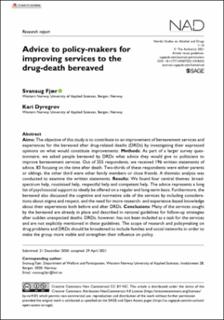| dc.contributor.author | Fjær, Svanaug | |
| dc.contributor.author | Dyregrov, Kari | |
| dc.date.accessioned | 2021-11-01T14:40:46Z | |
| dc.date.available | 2021-11-01T14:40:46Z | |
| dc.date.created | 2021-09-07T22:51:14Z | |
| dc.date.issued | 2021 | |
| dc.identifier.citation | Fjær, S., & Dyregrov, K. (2021). Advice to policy-makers for improving services to the drug-death bereaved. Nordic Studies on Alcohol and Drugs. | en_US |
| dc.identifier.issn | 1455-0725 | |
| dc.identifier.uri | https://hdl.handle.net/11250/2827014 | |
| dc.description.abstract | Aims:
The objective of this study is to contribute to an improvement of bereavement services and experiences for the bereaved after drug-related deaths (DRDs) by investigating their expressed opinions on what would constitute improvements.
Methods:
As part of a larger survey questionnaire, we asked people bereaved by DRDs what advice they would give to politicians to improve bereavement services. Out of 255 respondents, we received 196 written statements of advice, 83 focusing on the time after death. Two-thirds of these respondents were either parents or siblings, the other third were other family members or close friends. A thematic analysis was conducted to examine the written statements.
Results:
We found four central themes: broad-spectrum help, routinised help, respectful help and competent help. The advice represents a long list of psychosocial support to ideally be offered on a regular and long-term basis. Furthermore, the bereaved also discussed the cognitive and normative side of the services by including considerations about stigma and respect, and the need for more research- and experience-based knowledge about their experiences both before and after DRDs.
Conclusions:
Many of the services sought by the bereaved are already in place and described in national guidelines for follow-up strategies after sudden unexpected deaths. DRDs, however, has not been included as a task for the services and are not explicitly mentioned in these guidelines. The scope of research and policymaking on drug problems and DRDs should be broadened to include families and social networks in order to make the group more visible and strengthen their influence on policy. | en_US |
| dc.language.iso | eng | en_US |
| dc.publisher | Sage | en_US |
| dc.rights | Navngivelse-Ikkekommersiell 4.0 Internasjonal | * |
| dc.rights.uri | http://creativecommons.org/licenses/by-nc/4.0/deed.no | * |
| dc.subject | drug-related bereavement | en_US |
| dc.subject | policymaking | en_US |
| dc.subject | psychosocial follow-up | en_US |
| dc.subject | welfare services | en_US |
| dc.title | Advice to policy-makers for improving services to the drug-death bereaved | en_US |
| dc.type | Peer reviewed | en_US |
| dc.type | Journal article | en_US |
| dc.description.version | publishedVersion | en_US |
| dc.rights.holder | © The Author(s) 2021 | en_US |
| dc.source.pagenumber | 1-16 | en_US |
| dc.source.journal | Nordic Studies on Alcohol and Drugs | en_US |
| dc.identifier.doi | 10.1177/14550725211018333 | |
| dc.identifier.cristin | 1932215 | |
| dc.relation.project | Norges forskningsråd: 300732 | en_US |
| cristin.ispublished | true | |
| cristin.fulltext | original | |
| cristin.qualitycode | 1 | |

